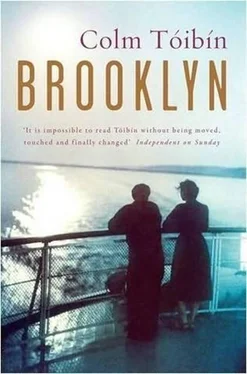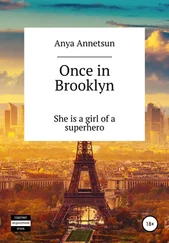Father Flood did not visit again; instead, he wrote a letter to her mother when he returned to Brooklyn, saying that he had spoken, soon after he arrived, to one of his parishioners, a merchant of Italian origin, about Eilis and wanted to let Mrs. Lacey know that there would soon be a position vacant. It would not be in the office, as he had hoped, but on the shop floor of the large store that this gentleman owned and managed. But, he added, he had been assured that, were Eilis to prove satisfactory in her first job, there would be plenty of opportunity for promotion and very good prospects. He would also, he said, be able to provide suitable documentation to satisfy the Embassy, which was often not so easy nowadays, and would, he was sure, be able to find suitable accommodation for Eilis near the church and not far from her place of work.
Her mother handed her the letter when she had it read. Rose had already gone to work. There was silence in the kitchen.
"He seems very genuine," her mother said. "I'll say that for him."
Eilis read the sentence again about the shop floor. She presumed that he meant she would work behind a counter. Father Flood did not mention how much she would earn, or how she would raise the money to pay the fare. Instead, he suggested that she should get in touch with the American Embassy in Dublin and ascertain precisely what documents she would require before she travelled so they could all be arranged. As she read and reread, her mother moved about the kitchen with her back to her, saying nothing. Eilis sat at the table, not speaking either, wondering how long it would take her mother to turn towards her and say something, deciding that she would sit and wait, counting each second, knowing that her mother had no real work to do. She was, in fact, Eilis saw, making work for herself so that she would not have to turn.
Finally, her mother turned and sighed.
"Keep that letter safe now," she said, "and we'll show it to Rose when she comes in."
Within weeks, Rose had organized everything, even managing to befriend by telephone a figure in the American Embassy in Dublin who sent the necessary forms and a list of doctors authorized to write a report on Eilis's general health, and a list of other things the Embassy would require, including a precise offer of work, work that Eilis was singularly qualified to do, a guarantee that she would be looked after financially on her arrival and a number of character references.
Father Flood wrote a formal letter sponsoring Eilis and guaranteeing to take care of her accommodation as well as her general and financial welfare, and on headed notepaper came a letter from Bartocci & Company, Fulton Street, Brooklyn, offering her a permanent position in their main store at the same address and mentioning her bookkeeping skills and general experience. It was signed Laura Fortini; the handwriting, Eilis noted, was clear and beautiful, and even the notepaper itself, its light blue colour, the embossed drawing of a large building over the letterhead, seemed heavier, more expensive, more promising than anything of its kind she had seen before.
It was agreed that her brothers in Birmingham would, between them, pay her passage to New York. Rose would give her money to live on until she was settled in her job. She told the news to a few friends, asking them not to tell anyone else, but Eilis knew that some of Rose's colleagues at work had heard the phone calls to Dublin; she was aware also that her mother would not be able to keep the news to herself. Thus she felt that she should go and tell Miss Kelly before she heard it from someone else. It was best, she thought, to go during the week, when things were not so busy.
She found Miss Kelly standing behind the counter. Mary was at the top of a ladder stacking packets of marrowfat peas on the higher shelves.
"Oh, you've come at the worst time now," Miss Kelly said. "Just when we thought we would have a bit of peace. Now don't disturb that Mary one whatever you do." She inclined her head in the direction of the ladder. "She'd fall as soon as she'd look at you."
"Well, I just came to say that I'll be going to America in about a month's time," Eilis said. "I'm going to work there and I wanted to give you plenty of notice."
Miss Kelly stood back from the counter. "Is that right?" she asked.
"But I'll be here on Sundays of course until I go."
"Is it a reference you're looking for?"
"No. Not at all. I just came to let you know."
"Well, that's lovely now. So we'll see you when you come home on holidays, if you'll still be talking to everyone."
"I'll be here on Sunday," Eilis said.
"Ah, no, we won't be needing you at all. If you're going, you're best to go."
"But I could come."
"No, you couldn't. There'd be too much talk about you and there'd be too much distraction and we're very busy on a Sunday, as you know, without that."
"I was hoping I could work until I left."
"Not here you can't. So be off with you now. We have plenty of work, more deliveries today and more stacking. And no time for talking."
"Well, thank you very much."
"And thank you too."
As Miss Kelly moved towards the store at the back of the shop, Eilis looked to see if Mary would turn so she could say goodbye to her. Since Mary did not, Eilis quietly left the shop and went home.
Miss Kelly was the only one who mentioned the possibility of her coming home on holidays. No one else mentioned it. Until now, Eilis had always presumed that she would live in the town all her life, as her mother had done, knowing everyone, having the same friends and neighbours, the same routines in the same streets. She had expected that she would find a job in the town, and then marry someone and give up the job and have children. Now, she felt that she was being singled out for something for which she was not in any way prepared, and this, despite the fear it carried with it, gave her a feeling, or more a set of feelings, she thought she might experience in the days before her wedding, days in which everyone looked at her in the rush of arrangements with light in their eyes, days in which she herself was fizzy with excitement but careful not to think too precisely about what the next few weeks would be like in case she lost her nerve.
There was no day that passed without an event. The forms that came from the Embassy were filled in and sent back. She went on the train to Wexford town for what seemed to her a cursory medical examination, the doctor appearing to be satisfied when she told him that no one in her family had suffered from tuberculosis. Father Flood wrote with more details, of where she would stay when she arrived and how close it would be to her place of work; her ticket arrived for the ship to New York, which would leave from Liverpool. Rose gave her some money for clothes and promised to buy her shoes and a complete set of underwear. The house was, she thought, unusually, almost unnaturally happy, and the meals they shared were full of too much talk and laughter. It reminded her of the weeks before Jack had left for Birmingham, when they would do anything to distract themselves from the thought that they were losing him.
One day, when a neighbour called and sat in the kitchen with them having tea, Eilis realized that her mother and Rose were doing everything to hide their feelings. The neighbour, almost casually, as a way of making conversation, said: "You'll miss her when she's gone, I'd say."
"Oh, it'll kill me when she goes," her mother said. Her face wore a dark strained look that Eilis had not seen since the months after their father died. Then, in the moments that followed, the neighbour appearing to have been taken aback by her mother's tone, her mother's expression became almost darker and she had to stand up and walk quietly out of the room. It was clear to Eilis that she was going to cry. Eilis was so surprised that, instead of following her mother into the hallway or the dining room, she made small talk with their neighbour, hoping her mother would soon return and they could resume what had seemed like an ordinary conversation.
Читать дальше












